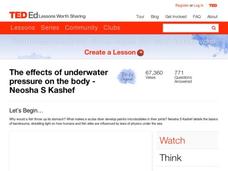Scholastic
Study Jams! Air Pressure & Wind
Blow your class away with a gust of humor as they watch this video about air pressure and wind. Along the way, they find that the density of air (as determined by temperature, altitude, and water vapor content) leads to air pressure...
TED-Ed
The Effects of Underwater Pressure on the Body
Exactly what causes the the pain you feel when diving to the deep end of a pool? Find out with this short video that explores the physical laws governing the behavior of gases and the ways they affect marine life and scuba divers that...
Crash Course
Partial Pressures & Vapor Pressure: Crash Course
How much pressure is exerted by the mixture of gases in a scuba tank? Introduce pupils to Dalton's Law of Partial Pressure and vapor pressure in the video sure to interest the class. The video also reminds viewers that gases are not...
Steve Spangler Science
Bursting Water Pipe - Cool Science Demo
Water is powerful! Because it expands as it freezes, if it does so in a closed system, tremendous pressure can be created. All it takes is a little break to cause the system to explode! It's unlikely that you would submerge a pipe full...
Curated OER
Bursting Water Pipe
Water is powerful! Because it expands as it freezes, if it does so in a closed system, tremendous pressure can be created. All it takes is a little break to cause the system to explode! It's unlikely that you would submerge a pipe full...
Bozeman Science
Water Potential
Water flow isn't solely based on gravity. Pupils explore the formula for the potential of water through a measurement of psi based on the solute potential and the pressure potential. The lesson analyzes the example of placing salt on a...
Mathispower4u
Linear Equation Application - Depth Under Water (Example)
Water pressure decreases at a constant rate with a change in depth. A video lesson demonstrates how to use a linear equation to determine the depth when given a specific pressure. Learners must substitute for the dependent variable to...
Curated OER
STEMbite: Atmospheric Pressure
Mr. Vanden Heuvel is in the bathroom again! This time he examines the strength of atmospheric pressure with a classic demonstration of filling a glass with water in the sink to reveal the column that fills the glass. Then he places a...
Curated OER
Vapor Pressue
A problem from a chemistry textbook is posed on the screen. Sal solves the problem which attempts to calculate vapor pressure using the Ideal Gas Law. The rate of evaporation of water given a certain volume, temperature, and pressure is...
Curated OER
Vapor Pressue
Vapor pressure is the focus of this chemistry video. Sal explains that, when molecules are "sticking together" a substance takes on a liquid, or a solid form. But when kinetic energy is increased, the molecules are forced apart and a...
Veritasium
Does Pressure Melt Ice?
Explore regelation of ice through a video demonstration. Applying pressure to a block of ice with a wire lowers the melting point and causes the ice to melt. As soon as the wire passes through, the water returns to its solid state as ice...
Steve Spangler Science
Steve Spangler on The Ellen Show February 2008
A lot goes on during this visit to the Ellen DeGeneres show. During the first segment, Spangler demonstrates the ability of the human body to act as a conductor of electricity and he shows the clean burning properties of hydrogen and...
Teacher's Pet
Phase Diagrams
This is one phase you'll enjoy going through with your class! Young chemists discover the components of phase diagrams in a video lesson. The narrator discusses temperature and pressure, then shows how their interaction affects the state...
Veritasium
Making SOLID Nitrogen!
Have you ever seen solid nitrogen? Or solid carbon dioxide? Watch as a pair of instructors adjust pressure to allow liquid nitrogen to solidify. After they finish, they put the solid nitrogen in water which produces carbon dioxide gas...
Veritasium
Why Is Ice Slippery?
Explore the science behind slippery ice. Ice is most slippery when it begins to melt, but even when temperatures are below freezing, ice becomes slippery when you walk on it. The video lesson explains how adding pressure to a solid...
Deep Look
Identical Snowflakes? Scientist Ruins Winter For Everyone
Can snowflakes be identical? Under perfect conditions, these perfect, unique crystals can have a twin. Explore snowflakes in the great indoors of a laboratory experiment to see how carefully regulated conditions have busted the myth of...
Scholastic
Study Jams! Weather & Climate
Introducing your class to weather concepts is a breeze with this fresh film! It differentiates between weather and climate, describes the factors that affect weather (temperature, air pressure and humidity), and displays Earth's climate...
Veritasium
How Can Trees Be Taller Than 10m?
The longest functioning straw is 10.3 meters tall. The dilemma—if this is true— is how can a tree be taller than 10.3 meters? A video researches the answer and presents it in a thought-provoking video lesson. There are many components to...
Crash Course
Fluid Flow and Equipment: Crash Course Engineering #13
Bernoulli knows best (at least about fluid mechanics). The 13th installment in the Crash Course Engineering series focuses on Bernoulli's principle. Viewers learn the relationship between the speed and pressure of fluids by watching a...
Teacher's Pet
Passive Transport Part 2
Cells require a specific amount of water—too much or too little causes problems. The video explains how cells handle having extra or not enough water. It includes plasmolysis, cytolysis, and facilitated diffusion.
Teacher's Pet
Le Châtelier
How do systems in equilibrium adjust to changes? Junior chemists examine Le Chatelier's Principle using a short video. The narrator illustrates how changing concentration, temperature, and pressure shifts the balance of reactants and...
Deep Look
If Your Hands Could Smell, You’d Be an Octopus
An octopus' tentacles are more like sticky, multipurpose tools than the simple leg-like appendages we view them as. Discover their amazing abilities, times eight, in an entertaining video. The narrator explains the senses located in each...
Curated OER
Phase Diagrams
In his previous videos, Sal shows students how to calculate how much energy is needed to change various amounts of water from state to state when the atmospheric pressure is constant. In this video, he shows students how to use phase...
Be Smart
8 Incredible Deep Sea Oddities!
The pressure at the bottom of the ocean is 10,000 times that at sea level. Scholars go under the sea as they learn about organisms found in the deep ocean waters. From angler fish to deep sea jellies that bioluminescence, viewers see...
Other popular searches
- Atmospheric Pressure Water
- Water Pressure Experiments
- Bill Nye Water Pressure
- Depth and Water Pressure
- Ocean Water Pressure
- Water Pressure Video
- Gravity and Water Pressure
- Water Pressure and Buildings
- Reservoir and Water Pressure
- Air Pressureand Water Vapor
- Water Pressure Breathing
- Water Pressure Milk Cartons

























